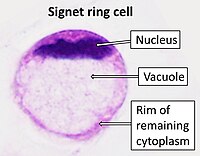
Photo from wikipedia
Chemotherapy and immunotherapy yield survival benefits for muscle‐invasive bladder cancer (MIBC) patients, in which tumor microenvironment has been found to exert crucial roles through tipping the balance between antitumor immunity… Click to show full abstract
Chemotherapy and immunotherapy yield survival benefits for muscle‐invasive bladder cancer (MIBC) patients, in which tumor microenvironment has been found to exert crucial roles through tipping the balance between antitumor immunity and immune evasion. Our study aims to explore the clinical significance and therapeutic role of intratumoral interleukin‐9‐producing cells (IL‐9+ cells) in MIBC. Two hundred fifty‐nine MIBC patients from two independent clinic centers were utilized for retrospective analysis in the study. Sixty‐five fresh MIBC tumor tissues were used to evaluate the infiltration and function of immune cells via flow cytometry and ex vivo intervention experiments. Three hundred ninety‐one MIBC patients of The Cancer Genome Atlas were applied for bioinformatics analysis. It was found that patients with high IL‐9+ cells infiltration had worse overall survival and relapse‐free survival. pT2 patients with low IL‐9+ cells infiltration could benefit more from adjuvant chemotherapy (ACT). IL‐9+ cells infiltration was correlated with decreased expression of granzyme B from CD8+ T cells and natural killer (NK) cells and perforin from CD8+ T cells, while blockade of IL‐9 reactivated the antitumor capacity of both cells leading to tumor regression. Furthermore, IL‐9+ cells infiltration could be a biomarker for predicting anti‐PD‐1 efficacy. In conclusion, IL‐9+ cells infiltration could be applied as an independent prognosticator for clinical outcome and ACT/anti‐PD‐1 effectiveness. IL‐9+ cells infiltration diminished the cytotoxicity of CD8+ T cells and NK cells resulting in tumor immune evasion, and thus targeting IL‐9 could be a potential therapeutic strategy for MIBC.
Journal Title: International Journal of Cancer
Year Published: 2020
Link to full text (if available)
Share on Social Media: Sign Up to like & get
recommendations!